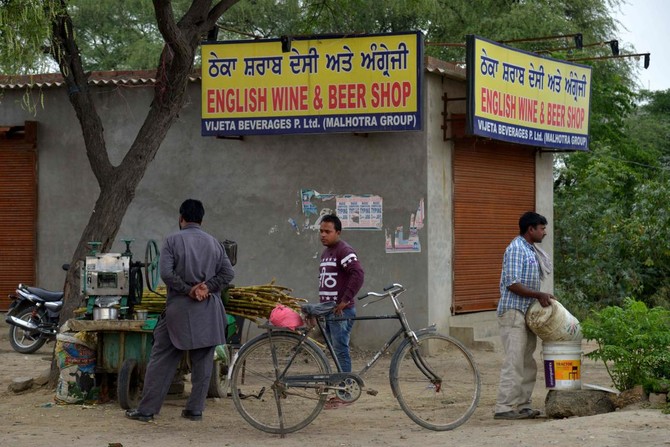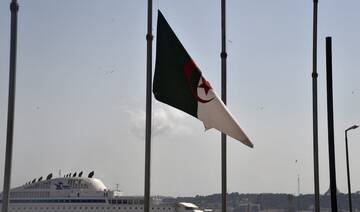GURGAON: When Shailja Singh headed to her favorite bar for a post-work beer this week she found it shut, victim of a Supreme Court ruling that has stopped India’s burgeoning alcohol and leisure industries in their tracks.
Thousands of liquor outlets were forced to close on April 1 after the order, which barred the sale of alcohol within a 500-meter (500-yard) range of a highway.
The ruling was meant to curb drink driving on India’s roads, the world’s deadliest, but has also shut down many bars, restaurants and hotels that serve tourists and office workers like Singh.
Fortunately for the 23-year-old, only half the bar-and restaurant-filled area in Gurgaon, a satellite city of New Delhi, is affected.
In a sign of the ruling’s arbitrary impact, the bars that fall just outside the 500-meter range are open, meaning she won’t have to go far to get a drink.
But for the businesses affected, the problem is not so easily solved.
“This is one of the most regressive steps that I’ve seen,” said one investor in a pub forced to go dry.
“The prime minister is talking about improving the ease of doing business. But first tell us can we do business to begin with? What are we telling foreign investors — overnight your investments can go?” said the investor, who asked not to be named.
India’s expanding middle class has made it a sparkling market for the alcohol industry.
In 2016 India alcohol sales were worth $40 billion, making it the eighth largest market by value globally.
It is expected to grow by six percent on average annually for the next four years, according to a Euromonitor International estimate.
“The liquor players, the tourism industry, they all had a strategy in place when they set up their businesses and then this verdict came in,” said an analyst at a Mumbai brokerage who asked not be named.
“This was completely unexpected and they will have to restrategise.”
Share prices of listed alcohol makers have already been hit.
United Spirits, which makes Black Label whisky and Smirnoff vodka in India, saw its shares fall by around nine percent on the Bombay Stock Exchange in the days immediately after the ban, despite a rising market.
Hotel and bar operators have also been affected.
Shahira Khan, assistant brand manager at The Beer Cafe chain of bars, said business was struggling.
“Earlier on normal weekdays we would get around 200 people each day. On weekends, around 250 people would walk in. Now we are hardly getting anyone,” she told AFP.
“After all, why would people come in? There is no beer at The Beer Cafe.”
Staff at a luxury hotel in Jaipur, a popular tourist destination in northern India, said they’d had several cancelations after they were forced to stop selling alcohol because the property falls within 500 meters of a highway.
The manager of the Chokhi Dhani said one group of Russian tourists were incensed when they were told they couldn’t get a drink.
“We tried telling them that it was a court order and we couldn’t do anything about it but they were obviously not pleased,” hotel manager Nupur Jain told AFP.
“They complained about how it spoiled all their plans and that they’d come there to have a good time.”
State governments and entrepreneurs have begun finding creative ways around the 500-meter limit.
Some states like Punjab have begun reclassifying highways as local roads to escape the ban, according to media reports.
Meanwhile some shopping malls and bar complexes are reportedly rerouting customers to a different entrance to increase their official distance from the road.
India has the world’s deadliest roads with nearly 150,000 people killed in 2015, according to the ministry of road transport and highways. Of those, 6,755 deaths were due to drunk driving.
The government has proposed more stringent sanctions for drunk drivers including fines of 10,000 ($154) and a jail term.
For the angry pub investor whose business has been wiped out, that is the solution.
“Instead of saying the law will be more stringent on anyone caught driving drunk, you’re saying let’s not sell alcohol. This is like saying there are rapists out there so women should not go out,” he said.
“What kind of a society are we living in?“
A booze ban stresses Indian business
A booze ban stresses Indian business

France, Algeria to resume security cooperation: minister

- Algeria plays a key role in the latter, sharing borders with junta-led Niger and Mali, both gripped by terrorist violence
ALGIERS: France and Algeria agreed on Tuesday to restart security cooperation during a visit to Algiers by French Interior Minister Laurent Nunez, marking the first sign of a thaw in diplomatic ties.
After meeting with President Abdelmadjid Tebboune, Nunez said both sides had agreed to “reactivate a high-level security cooperation mechanism.”
The visit took place against a backdrop of thorny relations between France and its former colony, frayed since Paris in 2024 officially backed Moroccan sovereignty over the disputed Western Sahara region, where Algeria supports the pro-independence Polisario Front.
Nunez said Monday had been devoted to working sessions aimed at “restoring normal security relations,” including cooperation in judicial matters, policing and intelligence.
He thanked the Algerian president for instructing his services to work with French authorities to “improve cooperation on readmissions.” Algeria has for months refused to take back its nationals living irregularly in France.
The renewed cooperation is expected to take effect “as quickly as possible” and continue “at a very high level,” Nunez confirmed.
According to images released by Algerian authorities, the talks brought together senior security officials from both countries, including France’s domestic intelligence chief and Algeria’s head of internal security.
Invited by his counterpart Said Sayoud, Nunez’s trip had been planned for months but repeatedly delayed.
Both sides have a backlog of issues to tackle. Before traveling, Nunez said he intended to raise “all security issues,” including drug trafficking and counterterrorism.
Algeria plays a key role in the latter, sharing borders with junta-led Niger and Mali, both gripped by terrorist violence.
Ahead of the trip, Nunez had also mentioned the case of Christophe Gleizes, a French sports journalist serving a seven-year sentence for “glorifying terrorism.”
It is unclear whether the matter was discussed with Tebboune, from whom the journalist’s family has requested a pardon.













